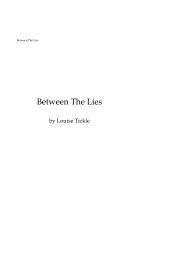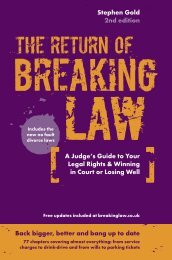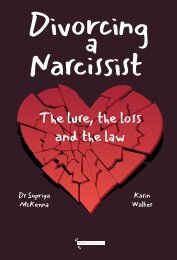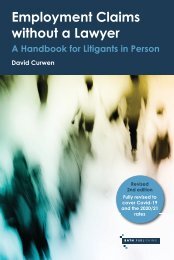Insolvency Made Clear: A Guide for Debtors
Plain English, practical guidance for anyone facing demands over a debt they are struggling to pay.
Plain English, practical guidance for anyone facing demands over a debt they are struggling to pay.
Create successful ePaper yourself
Turn your PDF publications into a flip-book with our unique Google optimized e-Paper software.
<strong>Insolvency</strong> Law <strong>Made</strong> <strong>Clear</strong> – A <strong>Guide</strong> For <strong>Debtors</strong><br />
will receive the same proportion of their loan as the other unsecured creditors.<br />
However, one notable exception is the spouse of the bankrupt. Spouses are demoted<br />
in the ordinary order since they are only repaid after the interest on debts<br />
is paid (s329 of the Act). To re-use the above example, if the unsecured debts<br />
can be broken into £30,000 from a bank, £10,000 from the bankrupt’s parents<br />
and £10,000 from the bankrupt’s spouse, the bank and the parents would share<br />
the £5,000 and would receive £3,750 and £1,250 respectively (they would each<br />
receive 12.5p in the pound). The spouse would receive nothing.<br />
The consequence of this order of distribution is that family members should be<br />
aware of the risk of lending money to someone who might go bankrupt: they<br />
are likely to receive the same return as the other creditors which is typically a<br />
few pennies in the pound. If the bankrupt did repay their family shortly be<strong>for</strong>e<br />
bankruptcy, the payment is likely to be undone as a preference (see Paragraph<br />
2.6 above). If a generous family member wishes to make a gift to the bankrupt,<br />
they are unlikely to want to pay the debts of the bankrupt. The family<br />
member, presumably, would want the bankrupt to have the money <strong>for</strong> themselves.<br />
However, such a gift would be ‘after-acquired property’, and the bankrupt<br />
would need to notify their Trustee of the payment under s333 of the Act. A<br />
Trustee in Bankruptcy could claim a gift <strong>for</strong> the estate under s307 of the Act<br />
(see below). The best way to help the bankrupt, there<strong>for</strong>e, is to purchase items<br />
<strong>for</strong> them which the Trustee in Bankruptcy will not want to resell, <strong>for</strong> example,<br />
to do the shopping <strong>for</strong> them, rather than give them the money to shop themselves.<br />
The alternative would be to agree the terms of the gift with the Trustee in<br />
Bankruptcy be<strong>for</strong>e it is made.<br />
If all the bankrupt’s creditors are paid, the bankruptcy will be annulled (see<br />
Paragraph 9.2).<br />
This distribution is the only amount creditors will receive. Creditors are not able<br />
to demand repayment through other routes, like sending in bailiffs, by virtue of<br />
s285 of the Act.<br />
2.15 Publicity of bankruptcy<br />
The name of the bankrupt, their address and their occupations are published on<br />
the public <strong>Insolvency</strong> Register. The register can be found at https://www.insolvencydirect.bis.gov.uk/eiir/.<br />
In practice, it is unusual <strong>for</strong> members of the public<br />
to check the <strong>Insolvency</strong> Register. However, it remains a matter of public record<br />
and it is routinely relied on by banks and potential lenders. There will also be a<br />
notice with similar in<strong>for</strong>mation made in the London Gazette, which is at https://<br />
www.thegazette.co.uk/.<br />
34













